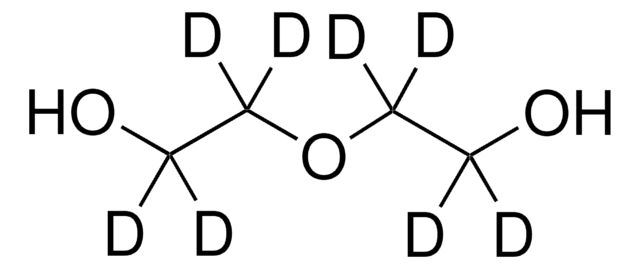93171
Diethylene glycol
BioUltra, ≥99.0% (GC)
Sinónimos:
2,2′-Oxydiethanol, 2-Hydroxyethyl ether, Bis(2-hydroxyethyl) ether, Diglycol
About This Item
Productos recomendados
vapor density
2.14 (vs air)
Quality Level
vapor pressure
0.01 mmHg ( 20 °C)
description
non-ionic
product line
BioUltra
assay
≥99.0% (GC)
form
liquid
viscous liquid
autoignition temp.
442 °F
expl. lim.
2-12.3 %
impurities
insoluble matter, passes filter test
≤30 mg/kg peroxides (as H2O2)
refractive index
n20/D 1.447 (lit.)
n20/D 1.447
pH
5.5-7.0 (25 °C, 50 mg/mL in H2O)
bp
245 °C (lit.)
mp
−10 °C (lit.)
solubility
H2O: 50 mg/mL at 20 °C, clear, colorless
density
1.118 g/mL at 25 °C (lit.)
anion traces
chloride (Cl-): ≤50 mg/kg
sulfate (SO42-): ≤50 mg/kg
cation traces
Al: ≤10 mg/kg
As: ≤0.1 mg/kg
Ba: ≤5 mg/kg
Bi: ≤5 mg/kg
Ca: ≤10 mg/kg
Cd: ≤5 mg/kg
Co: ≤5 mg/kg
Cr: ≤5 mg/kg
Cu: ≤5 mg/kg
Fe: ≤5 mg/kg
K: ≤200 mg/kg
Li: ≤5 mg/kg
Mg: ≤5 mg/kg
Mn: ≤5 mg/kg
Mo: ≤5 mg/kg
Na: ≤200 mg/kg
Ni: ≤5 mg/kg
Pb: ≤5 mg/kg
Sr: ≤5 mg/kg
Zn: ≤5 mg/kg
SMILES string
OCCOCCO
λ
50 mg/mL in H2O
UV absorption
λ: 260 nm Amax: ≤0.060
λ: 280 nm Amax: ≤0.030
InChI
1S/C4H10O3/c5-1-3-7-4-2-6/h5-6H,1-4H2
InChI key
MTHSVFCYNBDYFN-UHFFFAOYSA-N
¿Está buscando productos similares? Visita Guía de comparación de productos
Application
signalword
Warning
hcodes
Hazard Classifications
Acute Tox. 4 Oral
Storage Class
10 - Combustible liquids
wgk_germany
WGK 1
flash_point_f
280.4 °F - closed cup
flash_point_c
138 °C - closed cup
ppe
Eyeshields, Faceshields, Gloves, type ABEK (EN14387) respirator filter
Certificados de análisis (COA)
Busque Certificados de análisis (COA) introduciendo el número de lote del producto. Los números de lote se encuentran en la etiqueta del producto después de las palabras «Lot» o «Batch»
¿Ya tiene este producto?
Encuentre la documentación para los productos que ha comprado recientemente en la Biblioteca de documentos.
Los clientes también vieron
Nuestro equipo de científicos tiene experiencia en todas las áreas de investigación: Ciencias de la vida, Ciencia de los materiales, Síntesis química, Cromatografía, Analítica y muchas otras.
Póngase en contacto con el Servicio técnico








